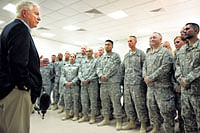As allies leave Iraq, US force is a coalition of one

Two days from now, there will no longer be any other nations with troops in Iraq — no ‘multi’ in the Multi-National Force. As Iraqi forces have increasingly taken the lead, the United States is the last of the ‘coalition of the willing’ that the Bush administration first brought together in 2003.
That’s partly because the Iraqi parliament left suddenly for summer recess without voting to extend an agreement for the British military to keep a residual training force of 100 soldiers in Iraq. As a result, those troops withdrew to Kuwait by Friday, according to a British diplomat, who declined to be identified in keeping with his government’s practice.
As for the other two small remnants of the coalition, the Romanians and Australians, the Aussies too left by July 31, and the Romanians left last Thursday, according to the Romanian charge d’affaires, Cristian Voicu. NATO will keep a small training presence in Iraq, but its troops were never considered part of the Multi-National Force because of opposition to the war from many NATO countries.
In response to a query, American military officials acknowledged the need for a name change, and said Multi-National Force-Iraq would officially become US Force-Iraq as of Jan 1, 2010, according to the deputy coalition spokesman, Lt Col Mike Stewart. “This is done to reflect the new bilateral relationship between US forces and our Iraqi hosts,” he said.
Even that relationship is very much on the wane, as the American military undergoes the complex process of withdrawing 1,30,000 soldiers over the next two years while shifting much of its attention to Afghanistan. As one Marine officer in Anbar province said recently, “We’re so out of here.”
Coalition of the willing
The phrase coalition of the willing became widespread after it was used by Secretary of State Colin L Powell before the American invasion, though from the start the title never got much respect. When it became clear that the United Nations was unwilling to back military action against Iraq, Powell named 30 countries that would pitch in. Nations contributing troops included Tonga, Mongolia, Nicaragua and Latvia. In all, 38 nations sent soldiers over the past six years, typically in groups numbering in the low hundreds, in rotations that were usually brief and sometimes even furtive. Japan sent a force but announced that it would not fight. Dutch troops had to be deployed just to guard it.
Iceland sent the smallest contingent, even before it cut its force in half — which left only one Icelandic soldier in Iraq.
Many coalition contributors lost soldiers in Iraq. Britain suffered the most, with 179 killed, since its troops were deployed in the restive southern province of Basra. The other 37 contributors lost a total of 139 soldiers. American fatalities have been 13 times those than all the others together, exceeding 4,300.
The disproportionate number of coalition casualties reflects their roles. Their chief utility was to free American soldiers from routine but necessary duties. Georgia’s fairly large contingent manned all the checkpoints in the fortified Green Zone of Baghdad, for instance, and brooked no arguments from people trying to enter, especially since few of the soldiers spoke anything but Russian or Georgian.
The deployment was popular with the Georgians, who often were seen buying reduced-price TVs and stereos at the PX to send home for resale. The country’s contribution grew to a peak of 2,000, until the soldiers were abruptly withdrawn last August and rushed home to defend Tbilisi after the Russians invaded.
Britain had stayed despite growing criticism at home, but its forces were steadily diminished until only 100 remained this month.
The security agreement with Britain was stalled in the Iraqi parliament by opposition from the Sadrist Bloc, followers of the militant Shiite cleric Muqtada al-Sadr, despite support from the Iraqi government.
Parliament will not reconvene until Sept 8. A British diplomat suggested the government might grant some temporary extension, but an Iraqi government spokesman, Ali al-Dabbagh, said that would not be possible.
Gangs on rampage
In Baghdad on Tuesday, a gang of armed men broke into a bank just after midnight, killing eight security guards and escaping with $6.3 million in Iraqi dinars that the American military fears insurgents might use to recruit members and to buy weapons.
“While I cannot confirm that the attacks were terrorist-related, it does fit past trends of terrorist groups in Iraq of financing their operations through criminal enterprise, like kidnappings for ransom, robberies and black marketeering,” Maj Dave Shoupe, a US military spokesman in Iraq, wrote in an e-mail message.
Seven of the Iraqi guards were found bound and blindfolded with strips of tape placed over their mouths, the Iraqi police said. Each had been shot once in the head, and pillows had been used to muffle the sound, the police said.
The eighth dead guard, who the police suspect had helped the robbers, was not bound, but had also been shot once, the authorities said.
Several bank employees were questioned by the police on Tuesday. The police officers and army personnel who had been stationed at two checkpoints near the bank were also questioned and have been suspended, an Iraqi police official said on condition of anonymity because he was not cleared to speak to reporters.
In eastern Baghdad, a bomb placed on a motorcycle exploded on Tuesday evening, killing at least eight people and wounding 13 others in the New Baghdad neighbourhood, the Iraqi police said.
The New York Times
Deccan Herald is on WhatsApp Channels| Join now for Breaking News & Editor's Picks